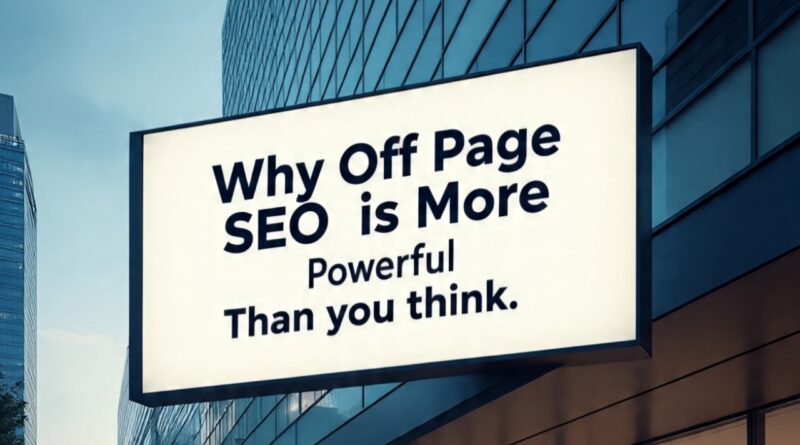Why Off Page SEO is More Powerful Than You Think
In the world of digital marketing, off-page SEO is often misunderstood or overlooked by beginners. Many focus heavily on on-page SEO—optimizing titles, meta tags, and content—without realizing that off-page SEO is what gives your website real power in the eyes of search engines. In fact, off-page SEO is one of the most influential factors behind high Google rankings, building authority, and attracting organic traffic. If you want your website to stand out and dominate search results, it’s time to dig deep into why off-page SEO is more powerful than you think.
What Is Off-Page SEO?
Off-page SEO refers to all the activities you do outside your website to improve its visibility and ranking on search engines. While on-page SEO focuses on content and structure, off-page SEO involves strategies like:
Backlink building
Social media signals
Guest posting
Brand mentions
Influencer collaborations
Forum postings
Content sharing and bookmarking
These actions signal to Google that others trust and value your website, which builds domain authority—a critical ranking factor.
Why Backlinks Are the Backbone of Off-Page SEO
The number and quality of backlinks pointing to your site play a huge role in how search engines rank your pages. A backlink is like a vote of confidence from another website. The more high-quality, relevant websites that link to yours, the more trustworthy Google thinks your content is.
However, not all backlinks are created equal. Google looks at:
Authority of the linking site
Relevance to your niche
Anchor text used in the link
Do-follow vs. no-follow links
Even one high-authority backlink can do more for your rankings than dozens of low-quality ones. That’s the power of strategic off-page SEO.
Off-Page SEO Builds Long-Term Authority and Trust
When your site is mentioned by authoritative platforms, Google considers you an authority too. Over time, these consistent mentions and links increase your domain authority (DA) and trust score—two major metrics that impact ranking.
Think of it this way: On-page SEO makes your content look good, but off-page SEO tells the world (and Google) that your content is worthy of attention.
It’s like being recommended by an expert. Even if you say your product is great, it means more when others vouch for you.
Social Media Signals and Their SEO Value
Though Google says social signals aren’t direct ranking factors, social engagement still indirectly helps your SEO. Here’s how:
Shares and likes increase brand visibility.
Social proof drives traffic.
High engagement may attract backlinks.
Virality leads to brand mentions across the web.
The more people share your content, the more chances it has to get noticed, linked, and ranked.
So if you’re not promoting your content across Facebook, LinkedIn, Twitter, Pinterest, and TikTok, you’re missing a key part of off-page SEO strategy.
Guest Posting Is Still a Goldmine
Many people think guest posting is dead. It’s not. High-quality guest posts on relevant sites give you two major benefits:
Backlinks from niche-related, trusted domains
Exposure to a new, targeted audience
The trick is to focus on value—write high-quality, original posts and don’t spam. Google penalizes manipulative guest posting, but when done right, it’s one of the strongest off-page SEO tactics out there
Influencer Marketing and Brand Mentions Boost Visibility
Collaborating with influencers—especially in your industry—can quickly boost your brand recognition. Even if they don’t link directly to your site, just mentioning your brand on a high-traffic platform tells Google you’re gaining attention.
Over time, these brand mentions act as implicit endorsements, helping your site appear more trustworthy and relevant in search results.
Forum Participation and Q&A Sites Create Authority.
Being active in relevant forums (like Reddit, Quora, or niche communities) helps establish your brand as an expert. While most links on these platforms are no-follow, they still:
Drive targeted traffic
Increase brand awareness
Attract future backlinks naturally
By consistently providing helpful answers, you build a reputation—and Google notices this brand visibility in off-site environments.
Content Sharing Platforms Multiply Reach
Don’t just publish your content and hope it ranks. Use off-page SEO by sharing your content across:
Medium
SlideShare
LinkedIn Articles
Scoop.it
Tumblr
These platforms expand your reach, help index your content faster, and increase chances of backlinks from interested readers or bloggers.
Off-Page SEO Has a Compounding Effect
One of the most powerful aspects of off-page SEO is that its benefits compound over time. The more backlinks and brand mentions you get, the higher you rank. And the higher you rank, the more people discover you, leading to:
More traffic
More shares
More links
More trust
This cycle snowballs your online presence into long-term SEO success.
Off-Page SEO Helps You Beat Competitors.
Let’s say two websites have equally good content and on-page SEO. What makes the difference?
Off-page signals.
The site with more high-quality backlinks, stronger authority, and better social signals will always rank higher.
That’s why off-page SEO is not just powerful—it’s essential if you want to outrank your competition.
Final Thoughts: Don’t Underestimate Off-Page SEO
Many beginner marketers focus only on on-site factors, thinking it’s enough to climb Google rankings. But Google’s algorithm relies heavily on off-page signals to determine which content is credible, valuable, and worthy of being shown on Page 1.
If you want to build a brand that lasts, off-page SEO is your secret weapon.
Focus on building quality backlinks, promoting your content smartly, collaborating with influencers, and being active in your niche communities. Over time, this off-site ecosystem will skyrocket your rankings, bring in consistent traffic, and build trust in your brand.
Start taking off-page SEO seriously today—because it’s more powerful than you think.




Pingback: What is Off-Page SEO? Complete Beginner’s Guide
Pingback: Top 10 Off Page SEO Techniques That Still Working Boost Ranking
Pingback: How to Build High Quality Backlinks for SEO